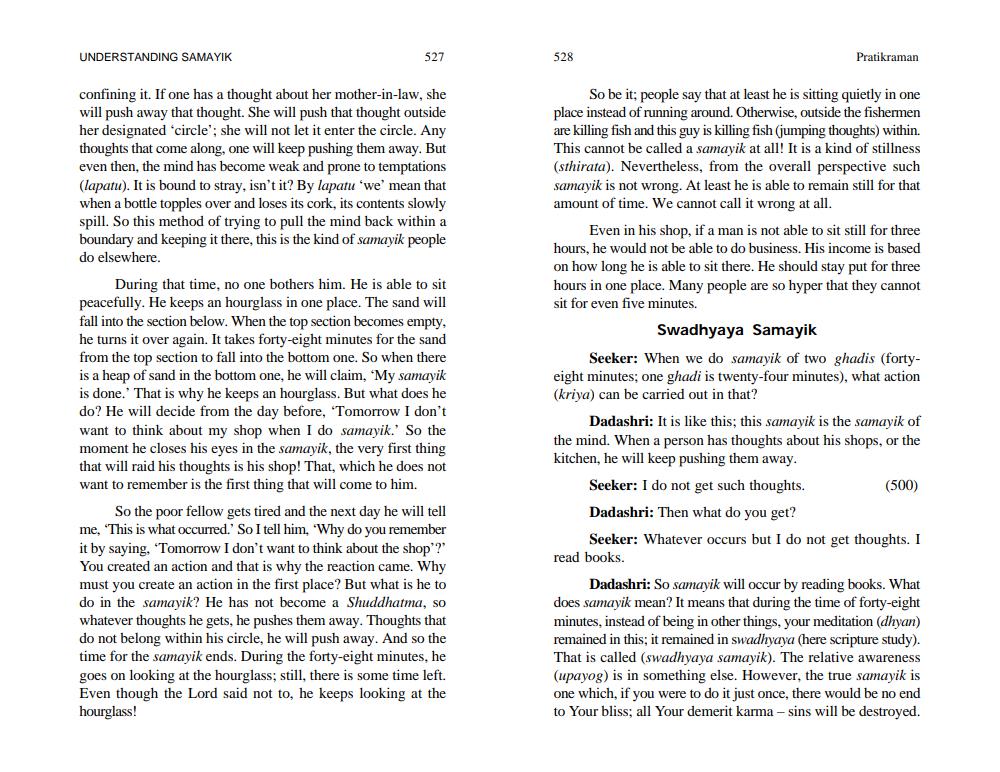________________
UNDERSTANDING SAMAYIK
527
528
Pratikraman
So be it; people say that at least he is sitting quietly in one place instead of running around. Otherwise, outside the fishermen are killing fish and this guy is killing fish (jumping thoughts) within. This cannot be called a samayik at all! It is a kind of stillness (sthirata). Nevertheless, from the overall perspective such samayik is not wrong. At least he is able to remain still for that amount of time. We cannot call it wrong at all.
Even in his shop, if a man is not able to sit still for three hours, he would not be able to do business. His income is based on how long he is able to sit there. He should stay put for three hours in one place. Many people are so hyper that they cannot sit for even five minutes.
Swadhyaya Samayik
Seeker: When we do samayik of two ghadis (fortyeight minutes, one ghadi is twenty-four minutes), what action (kriya) can be carried out in that?
confining it. If one has a thought about her mother-in-law, she will push away that thought. She will push that thought outside her designated 'circle'; she will not let it enter the circle. Any thoughts that come along, one will keep pushing them away. But even then, the mind has become weak and prone to temptations (lapatu). It is bound to stray, isn't it? By lapatu 'we' mean that when a bottle topples over and loses its cork, its contents slowly spill. So this method of trying to pull the mind back within a boundary and keeping it there, this is the kind of samayik people do elsewhere.
During that time, no one bothers him. He is able to sit peacefully. He keeps an hourglass in one place. The sand will fall into the section below. When the top section becomes empty, he turns it over again. It takes forty-eight minutes for the sand from the top section to fall into the bottom one. So when there is a heap of sand in the bottom one, he will claim, 'My samayik is done. That is why he keeps an hourglass. But what does he do? He will decide from the day before, 'Tomorrow I don't want to think about my shop when I do samayik.' So the moment he closes his eyes in the samayik, the very first thing that will raid his thoughts is his shop! That, which he does not want to remember is the first thing that will come to him.
So the poor fellow gets tired and the next day he will tell me, 'This is what occurred.' So I tell him, 'Why do you remember it by saying, "Tomorrow I don't want to think about the shop'?' You created an action and that is why the reaction came. Why must you create an action in the first place? But what is he to do in the samayik? He has not become a Shuddhatma, so whatever thoughts he gets, he pushes them away. Thoughts that do not belong within his circle, he will push away. And so the time for the samayik ends. During the forty-eight minutes, he goes on looking at the hourglass; still, there is some time left. Even though the Lord said not to, he keeps looking at the hourglass!
Dadashri: It is like this, this samayik is the samayik of the mind. When a person has thoughts about his shops, or the kitchen, he will keep pushing them away. Seeker: I do not get such thoughts.
(500) Dadashri: Then what do you get?
Seeker: Whatever occurs but I do not get thoughts. I read books.
Dadashri: So samayik will occur by reading books. What does samayik mean? It means that during the time of forty-eight minutes, instead of being in other things, your meditation (dhyani) remained in this; it remained in swadhyaya (here scripture study). That is called (swadhyaya samayik). The relative awareness (upayog) is in something else. However, the true samayik is one which, if you were to do it just once, there would be no end to Your bliss; all Your demerit karma - sins will be destroyed.




